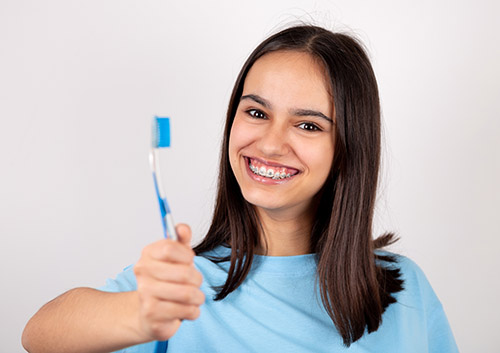When It Come to Chewing Gum, Be Choosy!
November 13th, 2024

Why do you chew gum? Perhaps because it’s a habit that comes with some healthy benefits. Chewing a stick or two reduces the urge to snack between meals. It’s a substitute for behaviors like nail biting that you’d like to change. It might even give you fresher breath after those tuna sandwiches in the cafeteria.
And, as it happens, chewing sugarless gum actually offers a few dental benefits as well! The act of chewing increases saliva production. Saliva washes away food particles, neutralizes acids in the mouth that can damage enamel, and even bathes the teeth in essential minerals that help strengthen weakened enamel. We’re talking about sugar-free gum here, of course, because regular gum will just bathe your teeth in sugar—no one’s idea of a dental benefit!
So why not open that pack and enjoy? Because, despite the many positive reasons you can think of for chewing gum, sometimes gum can have a negative impact on your braces.
- A Sticky Situation
Keeping your braces clean can be a bit of a challenge. That’s why you have special toothbrushes, flosses, and interproximal brushes to get rid of food particles that stick around after you eat. And, while any food can get caught in your braces, sugared gum, because it is so sticky, can stick to appliances much more easily and much more thoroughly than even sugar-free gum. You might be able to remove gum residue with regular brushing and flossing, but, worst case scenario, you might be looking at gum firmly stuck in the brackets or between the brackets and wires.
- Gumming Up the Works
Chewing gum can also affect your treatment time if the action of chewing causes your arch wire to bend. When your wire isn’t providing the proper shape or the right amount of tension, your teeth won’t get to where they need to be as quickly and efficiently. No piece of gum is worth discovering at your next appointment that you haven’t made any progress for weeks due to a damaged wire. And since chewing gum can also lead to loose brackets and bands, you might wonder if this sticky habit is ever worth the trouble it can cause.
- Something to Chew Over
Before you decide, talk to Dr. Pope! Chewing sugarless gum increases saliva production, which can help wash away food particles from your mouth and your braces. As an added benefit, the action of chewing for a few minutes after an appointment has been shown to reduce the discomfort of an adjustment. Because today’s braces are stronger and more durable, and sugarless gum much less likely to stick to them, we can let you know if chewing gum might be acceptable or even desirable depending on your specific treatment plan and your appliance.
Talk to us at your next appointment at our Flossmoor and New Lenox, IL office about gum chewing, and we’ll give you the very best recommendations for keeping your teeth healthy, your braces clean, your appliance intact, and your treatment plan on track. Even if gum needs to be off the menu for a while, what you’ll get in return—the best and fastest path to your beautiful smile—will be well worth it!





 Website Powered by Sesame 24-7™
Website Powered by Sesame 24-7™